Over 500 Workers Collapsed From Heatstroke In Iran
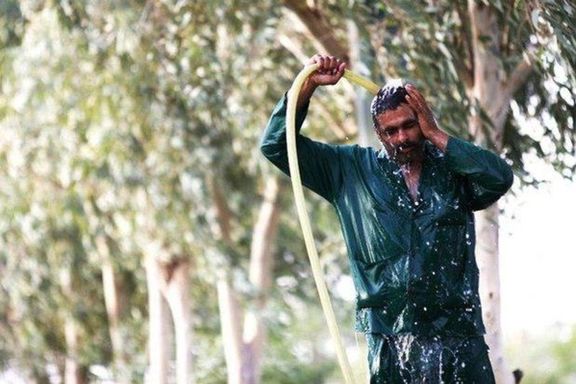
More than 500 workers of different oil and gas projects in southern Iran have been hospitalized with a number of them dead due to high temperatures in recent days.

More than 500 workers of different oil and gas projects in southern Iran have been hospitalized with a number of them dead due to high temperatures in recent days.
An oil sector wokers' union announced on Saturday that at least two people have died this week in the city of Abadan due to heatstroke and weakness caused by hours of exhausting work in extreme heat.
Two weeks ago another worker died during work in the provincial capital of oil-rich Khuzestan while the government offices and businesses were closed due to high temparatures.
Despite temperatures rising to more than 50 degrees Celsius – about 122 in Fahrenheit scale – in the southern parts of the country, where most of the oil and gas plants are located, subcontractors for the government refuse to stop work even for a few hours.
According to reports, the working conditions in the port city of Asaluyeh in Bushehr province is so bad that at least 100 workers are taken to hospitals for heatstroke daily, as the temperature has reached 53 degrees and the humidity is over 90 percent.
Amid a dire economic situation in Iran at least 10 workers have committed suicide in the last three months due to dismissal from their jobs and "livelihood problems". The latest happened on Saturday in the western city of Ilam.
With food prices rising faster after four years of United States’ ‘maximum pressure’ sanctions, Iranian workers and retirees have been holding regular protests or strikes to demand higher salaries.
In May, widespread protests by workers, shop owners, and teachers against poverty, inflation, and low wages, were met with heavy-handed crackdown and numerous arrests by security forces.
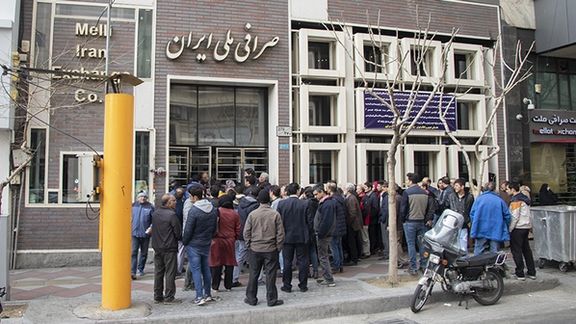
Iran’s currency has surprisingly risen by 7 percent in recent days despite no improvement in the economy and no clarity over the prospects of a nuclear deal.
The latest round of nuclear talk in Vienna ended on August 8 with the European Union presenting what it called the draft of a final agreement to Iran and the United States for reviving the 2015 nuclear deal, the JCPOA. The Iranian delegation returned to Tehran saying the EU document is not a final deal, but a proposal that Iran will study.
Nevertheless, the rial rose against the US dollar. It traded at almost 300,000 on Sunday, August 14, rising from a low of 320,000 to the dollar.
Since the US left the JCPOA in 2018 and the rial fell ninefold in the following years, its exchange rate has fluctuated with news about the prospects of a nuclear deal, because that would lift crippling US sanctions. In the absence of any sign that Tehran is about to accept the EU proposal, the rial’s rise is hard to explain.
One possibility is that the top leadership intends to accept the offer, which is reportedly very generous. Since the biggest economic players in the country are the same leaders who control 80 percent of the centralized economy, it is possible that insider information is helping the rial to regain some territory.
The other possibility is quite the opposite. The government is pumping dollars into the currency market to defend the rial, which has a direct impact on soaring prices. If the Islamic Republic intends to reject or postpone a nuclear deal, it wants to signal to its restless population that all is well, and the national currency is not about to fall to new lows.
Tehran has also been keen to tell the world that it can survive under US sanctions and is not desperate for a nuclear deal. A stable, though weak currency, can also be a signal to the West that Iran is not under economic pressure to make concessions.
But the economic news is not good and those who follow the ups and downs of the situation in Iran can point to ample evidence of a persisting crisis.
On Sunday, a member of parliament pleading with the Speaker, Mohammad Bagher Ghalibaf (Qalibaf), asked for clarity about the nuclear talks. Speaking about galloping prices, MP Shahbaz Hassanpur said, “Prices are so out of control that talking about them brings shame to us.”
Latest official figures show the annual inflation rate stands at 54 percent, while food prices have risen by more than 100 percent since last August.
There have been almost continuous protests in different parts of the country, but nothing that the regime cannot control with overwhelming military force, killings, arrests and disappearances.
Meanwhile, it has increased the export of its sanctioned oil since the US entered nuclear talks in early 2021. From a low of 250,000 barrels per day in 2019-2020, Tehran is now shipping more than three times that quantity, mostly to China. Higher oil prices have also helped, although Iran offers discounts and undergoes high costs to make illicit shipments.
Having some financial cushion, the regime can hope to maintain its grip on power without getting rid of US sanctions, and even stabilize its currency at low levels.
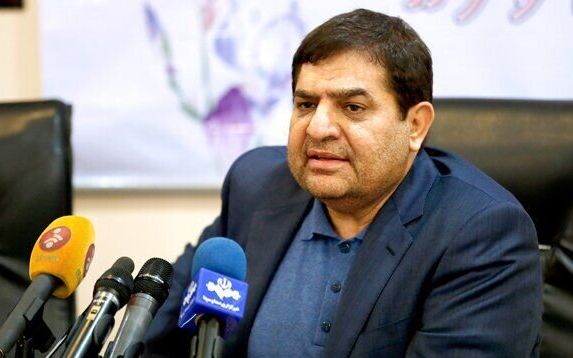
Iran's ultraconservatives feeling vulnerable by the economic failures of the government are making moves to bring down Vice President Mohammad Mokhber.
The economic failure of President Ebrahim Raisi’s government has become clear to most Iranians, including the ultraconservatives or hardliners who fully backed him one year ago as he took office. Mokhber is Raisi’s economic czar who can be easily blamed for a 54-percent inflation rate and rising poverty with its political implications.
The economic crisis did not start with Raisi. Iran’s situation quickly deteriorated when the United States withdrew from the JCPOA nuclear agreement in 2018 and imposed crippling sanction. It was a repeat of early 2010s, when the United Nations imposed sanctions on Iran for pursuing a dangerous nuclear program. However, the Raisi government is being blamed for a high degree of inefficiency, lack of planning and highly questionable appointments.
Proreform daily Arman Melli wrote in a report on its Saturday that a demand to fire Mokhber is a message the conservative camp has been lately sending to president Raisi. According to the daily, this group of Iranian conservatives are determined to prove that the Raisi administration is inefficient.
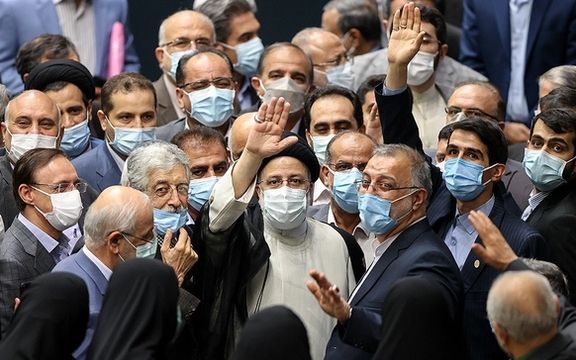
The paper wrote that some Iranian conservatives wanted a hardliner politician as vice President last year, but Raisi chose to work with Mokhber, who was a key official in the business conglomerates operating under the aegis of Supreme Leader Ali Khamenei.
One year after his appointment as vice president, it is still not quite clear whether it was Raisi who asked Mokhber to join his cabinet or Khamenei, who knew Raisi did not have any executive experience, planted Mokhber in the government to make up for Raisi's shortcomings.
The report says that some ultraconservatives such as Javad Karimi Qoddousi: "I wish to tell the President that Mr. Mokhber lacks the capabilities required for his post. His staying in this position even for one hour will lead to losses for the government."
The ultraconservatives have also mentioned the discord between Mokhber and the other members of Raisi's economic team, particularly Vice President for Economic Affairs Mohsen Rezaei, as another reason for Mokhber's dismissal.
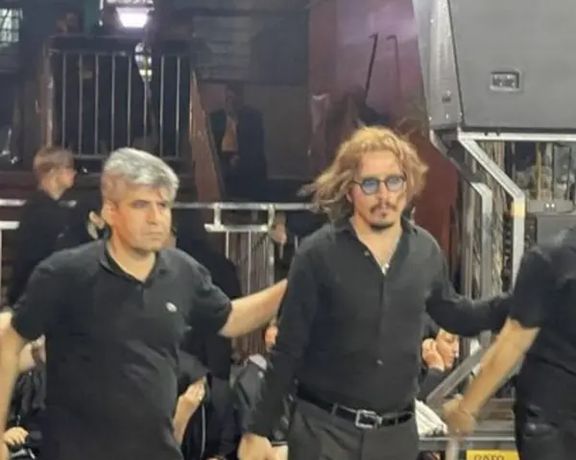
Last week, a big gaffe by Mokber led to a lot of public ridicule. A lookalike of American actor Johnny Depp showed up at a religious mourning ceremony and Mokhber tweeted, praising Depp for taking part in a Shiite religious event. When social media users and politicians reminded him that the person was only a lookalike of the US actor, Mokhber's office claimed that his tweet was somehow fabricated.
All these could be more meaningful with a report in reformist Shargh newspaper that went viral on Saturday. The report by its editor Ahmad Gholami said that "the Raisi administration is a continuation of the government of populist President Mahmoud Ahmadinejad and that it will inevitably sink in the same quagmire that Ahmadinejad's administration faced."
Gholami argued that both Ahmadinejad and Raisi started their terms of office by promising they would change everything, but Ahmadinejad gradually failed as economic conditions worsened in the early 2010s with UN sanctions.
Shargh's editor predicted that the Raisi administration will eventually suffer the same fate. However, to be fair and on the safe side, Gholami observed that the Raisi is shouldering a heavier burden of all sorts of economic problems that have accumulated during his predecessors and it is highly unlikely that he could find a way out of those problems as all roads ahead inevitably lead to the same quagmire.
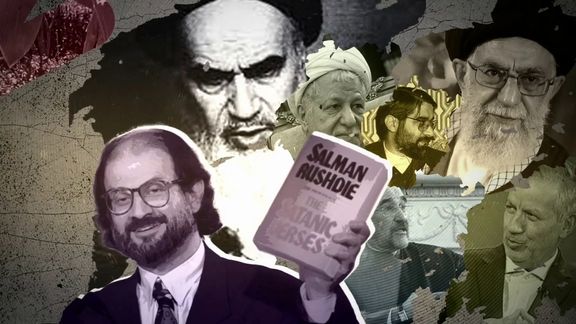
A newspaper in Iran closely affiliated with the country’s ruler Ali Khamenei has called the assassination attempt on author Salman Rushdie “divine vengeance”.
Iran’s government and top officials have not reacted to the attack in New York on Friday. While the hardliner media have welcomed the move implicitly or even openly, praising the assailant. Kayhan daily linked to the Supreme Leader, for instance on Saturday said “a thousand bravos” to the man who attacked Rushdie, implying that his throat should have been cut. In its Sunday edition, the paper said, “divine vengeance befell Salma Rushdie” and predicted that former US President Donald Trump and his Secretary of State Mike Pompeo are next.
Some Iranian media and political figures have adopted a different tact accusing opponents of the revival of the 2015 nuclear deal of using the attack on Salman Rushdie as a means of sabotaging a possible nuclear agreement.
Proponents of the conspiracy theory claim there is a possible involvement of Iran’s opponents, particularly Israel, who want to discredit the Iranian government and sabotage agreement on the revival of the Joint Comprehensive Plan of Action (JCPOA) and lifting of US sanctions.
Hardliner Mohammad Marandi who has acted as a spokesman-cum-advisor of the Iranian negotiators in Vienna nuclear talks, tweeted that he would not be shedding tears “for a writer who spouts hatred and contempt for Muslims and Islam” but went on to ask if it “isn’t odd that as we near a potential nuclear deal, the US makes claims about a hit on Bolton... and then this happens?”

“I'm not an exponent of conspiracy theories, but simultaneousness of the news about plans to assassinate [John] Bolton and the attack on Rushdie with the finalization of talks to restore the JCPOA isn’t not credible to me,” reformist' politician and commentator Abbas Abdi who is an ardent critic of the Raisi government, tweeted.
It is quite possible that the recent ‘plots’ against US officials and citizen as well as Rushdie were organized by the Israeli intelligence to prevent diplomatic solutions to the disputes between Tehran and Washington, Reza Nasri, a commentaor said in a tweet while in a commentary Saturday the conservative Alef news website said the West would devise ‘propaganda scenarios’ against Iran revolving around the attack on Rushdie.
Others on social media have seen these statements as an attempt by Iran to create confusion to deflect blame for a death fatwa issued 34 years ago against Rushdie that could have led to the Friday knife attack.
The 15 Khordad Foundation, a charity organization that put the multi-million-dollar bounty on Rushdie’s head in 1989 and even increased it by half a million to $3.3 million in 2012, has so far remained silent about the assassination attempt.
Hadi Matar (24), the suspect in the stabbing of Rushdie at an event in New York state, has now been charged with attempted murder and is being held without bond, prosecutors in Chautauqua County said on Saturday.
A preliminary law enforcement review of Matar's social media accounts showed he was sympathetic to Shi'ite extremism and Iran's Islamic Revolutionary Guard Corps (IRGC), although no definitive links had been found, according to NBC New York.
In the US, Republicans have demanded that the Biden administration must put an end to negotiations with Iran in view of the terrorist act against Rushdie sanctioned by Khomeini's fatwa as well as the alleged recent Iranian plots against US officials and citizens including John Bolton, Mark Pompeo, and Masih Alinejad, an Iranian American activist.
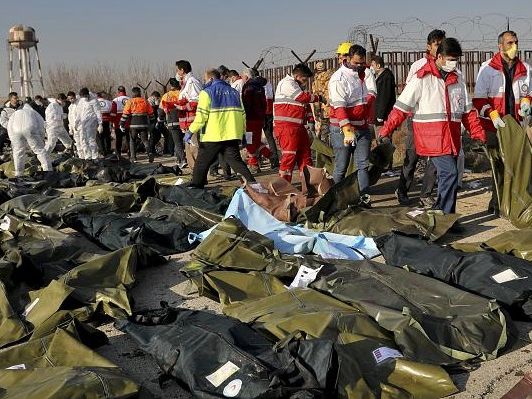
The Canadian foreign ministry told Iran International on Friday that attempts to negotiate with Tehran about Flight PS752, shot down by Iran in 2020, are futile at this time.
Marilyne Guèvremont, a spokesperson from Global Affairs Canada, said the families, and the victims, are at the heart of the International Coordination and Response Group’s efforts in the pursuit of truth, justice, and accountability, noting that the body has determined further attempts to negotiate with the Islamic Republic authorities are in vain.
The coordination group represents states whose citizens were among 176 passengers killed when Iran’s Revolutionary Guard fired two missiles at the place as it was taking off from Tehran on January 8, 2020.
Describing it as a reprehensible tragedy, she said, “We are now focused on the subsequent actions to resolve this matter in accordance with international law. We will not rest until the families get the justice, transparency and accountability from Iran that they deserve.”
According to a document obtained by Iran International, the Swiss embassy in Tehran, which represents US interests, has officially informed Tehran about a lawsuit filed against the Islamic Republic and IRGC by families of victims of the Ukrainian plane.
In June, Canada also announced that it has notified Iran of Ontario's Superior Court of Justice’s ruling that IRGC’s downing of Ukraine Airlines Flight PS752 was intentional.
Earlier in August, the father of one of the victims embarked on a symbolic 400-kilometer march after a press conference at his son's grave in Richmond Hill, Ontario, and will go to Ottawa to personally deliver his protest letter to Prime Minister Justin Trudeau.
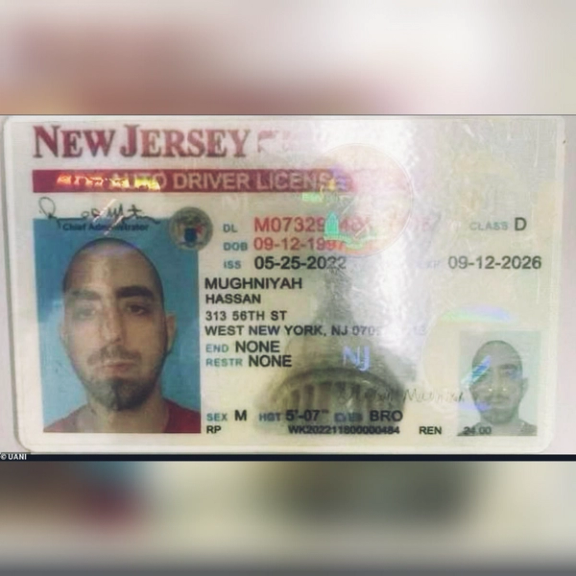
The suspect in the attack on Salman Rushdie was sympathetic to Shi'ite extremism and Iran's Islamic Revolutionary Guard Corps (IRGC), NBC New York cited law enforcement sources as saying on Saturday.
Rushdie, who spent years in hiding after Iran urged Muslims to kill him over his novel "The Satanic Verses", was stabbed in the neck and torso on stage at a lecture on Friday.
Police have identified the suspect in custody as Hadi Matar, a 24-year-old man from Fairview.
A preliminary law enforcement review of Matar's social media accounts showed he was sympathetic to Shi'ite extremism and IRGC causes, NBC New York reported.
Matar was born in California and recently moved to New Jersey, the NBC New York report said, adding that he had a fake drivers license on him.
NBC New York said the official told it that there were no definitive links established to the IRGC, but the initial assessment indicated the suspect was sympathetic to the Iranian government group.
There has been no official government reaction in Iran to the attack on Rushdie, but several hardline Iranian newspapers expressed praise for his assailant.
Ali Tehfe, mayor of Yaroun in the south of Lebanon, said that the suspect was the son of a man from the town. The suspect's parents emigrated to the United States, and he was born and raised there, the mayor added, but said he had "no information at all" on their political views.
An official from Hezbollah told Reuters that the Iran-backed Lebanese armed group had no additional information on the attack on Rushdie.
Reporting by Reuters